The Strengthening Health with INnovation and Engagement (SHINE) research program engages in research that (a) enhances our understanding of the relationships between resilience, trauma, and health outcomes among individuals with HIV and those at risk for HIV, (b) investigates psychosocial (e.g., discrimination) and structural factors (e.g., poverty) that relate to health disparities, (c) develops effective prevention and intervention strategies to promote resilience and good health outcomes, and (d) engages community members and stakeholders in research.
SHINE Research Program - Current Projects
A Randomized Control Trial of Striving Towards EmPowerment and Medication Adherence (STEP-AD) among Black Women Living with HIV
NIMH R01MH135833
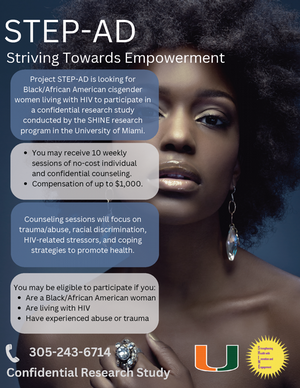
STEP-AD is funded by a R01 grant from the National Institute of Mental Health. The purpose of STEP-AD is to assess the efficacy of a 10-session intervention that incorporates behavioral therapy and coping strategies to improve mental health, medication adherence, and viral suppression of Black women living with HIV. The intervention combines cognitive-behavioral and problem-solving techniques, healing from trauma, coping strategies for stressors Black women living with HIV face, and self-care to promote medication adherence. This study involves 15 study visits over a 1.5 year period and eligible participants can receive compensation of up to $1,000 for their participation.
You may be eligible to particpate if you:
- Are a Black/African American woman
- Are living with HIV
- Have experienced abuse or trauma
Five Point Initiative: a Cluster Randomized Trial of a Bundled Implementation Strategy to Address the HIV Epidemic in Black Communities
NIMH R01MH134269
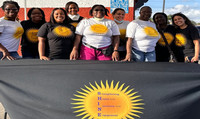 The Five Point Initiative is a locally developed and community co-developed bundled implementation strategy that harnesses the collective contribution of community consultants/collaborators, community businesses, and healthcare organizations to improve HIV testing and PrEP linkage.
The Five Point Initiative is a locally developed and community co-developed bundled implementation strategy that harnesses the collective contribution of community consultants/collaborators, community businesses, and healthcare organizations to improve HIV testing and PrEP linkage.
This R01 NIMH funded study is a stepped wedge cluster randomized control trial to assess the effectiveness of the FPI implementation strategy in increasing HIV testing, PrEP linkage and knowledge, and condom use/access. A total of 8 predominantly Black communities will receive the FPI intervention via a stepped wedge design. Once introduced to the intervention two events per month will be conducted in each zip code for 21 months.
This study involves completion of a brief survey, HIV testing, and PrEP education and linkage, in exchange for a $25 voucher towards products and services at the local businesses partnering with us at these community events.
You may be eligible to participate if you:
- Are at least 18 years or older
- Are present during community events at the “five points” (e.g., corner store/grocery/neighborhood restaurant, laundromat, barbershop, hair/beauty salon store or salon, and car service provider [e.g. gas station, mechanic, car wash]) in select predominantly Black communities in Miami.
Understanding Intersectional Discrimination and Adversities among Black Queer Women Living with HIV
3R01MH121194-03S1
This project will (a) examine the quantitative data for the queer women in MMAGIC (compared to non-queer women) on microaggressions (LGBTQ-, race-, gender- and HIV-related), macro discrimination (LGBTQ-, race-, gender- and HIV-related), trauma/violence, mental health, and HIV outcomes and observe how the variables relate and change over time and (b) conduct in-depth qualitative interviews with 20-30 of the women on their experiences of intersectional discrimination and microaggressions and how they are navigating these experiences (e.g., helpful coping and resources). This supplement will also provide training opportunity for Mya Wright (PhD student) who will be (a) mentored by renown scholars (Drs. Dale, Bowleg, Logie, and Ironson) in HIV and intersectionality (b) obtain expertise in qualitative methods and advanced quantitative skills for assessing intersectional adversities among Black queer women living with HIV, (c) enhance and develop skills to utilize research findings to inform the development of culturally competent interventions for racial and sexually minoritized women, and (d) strengthen her skills in manuscript preparation, publication, and grant writing.
Gentrification, Outcome, and Living with HIV (GOAL)
 Project GOAL is funded by a Provost Research Award from the University of Miami and co-led by Dr. Ian Wright (PI), Assistant Professor of Economics, and Dr. Sannisha Dale (Co-PI). Project GOAL will empirically examine how gentrification in South Florida (focusing on Miami-Dade and Broward counties) relate to mental and physical health outcomes of BWLWH who are enrolled in MMAGIC’s longitudinal cohort (see above). GOAL has three specific aims: (1) Examine how gentrification (based on an index of their neighborhood) relates to mental (depression and PTSD symptoms) and physical (HIV viral load) outcomes for BWLWH in South Florida, (2) Analyze how changes in gentrification indexes (due to relocation overtime) relate to changes in mental (depression and PTSD symptoms) and physical (HIV viral load) outcomes for BWLWH, and (3) Evaluate if close by neighborhoods (within a five to ten-mile radius) that are gentrifying or gentrified are important in explaining variations in mental and physical health outcomes.
Project GOAL is funded by a Provost Research Award from the University of Miami and co-led by Dr. Ian Wright (PI), Assistant Professor of Economics, and Dr. Sannisha Dale (Co-PI). Project GOAL will empirically examine how gentrification in South Florida (focusing on Miami-Dade and Broward counties) relate to mental and physical health outcomes of BWLWH who are enrolled in MMAGIC’s longitudinal cohort (see above). GOAL has three specific aims: (1) Examine how gentrification (based on an index of their neighborhood) relates to mental (depression and PTSD symptoms) and physical (HIV viral load) outcomes for BWLWH in South Florida, (2) Analyze how changes in gentrification indexes (due to relocation overtime) relate to changes in mental (depression and PTSD symptoms) and physical (HIV viral load) outcomes for BWLWH, and (3) Evaluate if close by neighborhoods (within a five to ten-mile radius) that are gentrifying or gentrified are important in explaining variations in mental and physical health outcomes.
Past Research Projects
Monitoring Microaggressions and Adversities to Generate Interventions for Change (MMAGIC)
NIMH 5R01MH121194
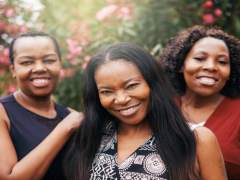 This project builds off of our 1-year R56 NIMH project which further demonstrated the importance of longitudinally studying the unique role of microaggressions and frequent adversities (e.g. violence/trauma, housing and food insecurity) in relation to HIV viral suppression among BWLWH. This project continues to assess whether microaggressions (daily slights) and discrimination experienced by BWLWH negatively impact HIV viral suppression by way of mental health symptoms (e.g. post-traumatic stress symptoms, depression, anxiety, substance use) and health behaviors (ART adherence and engagement in care). We will longitudinally examine both potential direct effects and moderation by resilience factors at the individual (e.g. self-efficacy), interpersonal (e.g. social support), and neighborhood level (e.g. community health centers). By elucidating these pathways to viral suppression among BWLWH and having ongoing engagement with community partners, our findings will directly inform interventions for BWLWH. This project is precisely aligned with the NIH HIV/AIDS (high) Research Priority for supporting research to reduce health disparities in treatment outcomes of those living with HIV.
This project builds off of our 1-year R56 NIMH project which further demonstrated the importance of longitudinally studying the unique role of microaggressions and frequent adversities (e.g. violence/trauma, housing and food insecurity) in relation to HIV viral suppression among BWLWH. This project continues to assess whether microaggressions (daily slights) and discrimination experienced by BWLWH negatively impact HIV viral suppression by way of mental health symptoms (e.g. post-traumatic stress symptoms, depression, anxiety, substance use) and health behaviors (ART adherence and engagement in care). We will longitudinally examine both potential direct effects and moderation by resilience factors at the individual (e.g. self-efficacy), interpersonal (e.g. social support), and neighborhood level (e.g. community health centers). By elucidating these pathways to viral suppression among BWLWH and having ongoing engagement with community partners, our findings will directly inform interventions for BWLWH. This project is precisely aligned with the NIH HIV/AIDS (high) Research Priority for supporting research to reduce health disparities in treatment outcomes of those living with HIV.
300 BWLWH enrolled in Miami and followed over 4 years. Data on microaggressions, discrimination, trauma and violence, mental health symptoms, medication adherence, engagement in care, viral suppression, and resilience factors will be collected at assessment visits every 3 months. Given the daily nature of microaggressions we used an innovative text-message ecological momentary assessment methodology shown to be feasible in our R56. Annually, we gathered information (using zip codes) from public data sources on neighborhood level resilience resources such as number and distance to community health centers and domestic violence centers.
This study involved assessments every 3 months over the course of 4 years and included one short text message sent to your mobile phone daily for a 30-day period in-between assessment visits. Eligible participants received compensation of up to $1,200.
MMAGIC – Brain Health

Brain Health Study is a sub-study of MMAGIC (an ongoing longitudinal cohort study; see MMAGIC description above) and is funded by a University of Miami Provost Research Award to Dr. Sannisha Dale. This study seeks to understand brain function while living with HIV and data collection involves survey completion and other assessments of neurological functioning. All MMAGIC participants are eligible to participate and will receive compensation of $40.

PrEP for Us
PrEP for Us was funded by Merck & Co. and was led by investigators at Brigham and Women’s Hospital (Dr Bisola Ojikutu) and the University of Miami (Dr. Sannisha Dale). PrEP for Us assessed the needs, preferences, challenges, and facilitators related to pre-exposure prophylaxis (PrEP) use among women who are at risk for HIV. Data was collected through a combination of surveys and individual interviews. Participants were compensated $40 for participation in an individual interview.
 Addressing Unmet PrEP Needs
Addressing Unmet PrEP Needs
Addressing Unmet PrEP Needs was an EHE supplement funded by the National Institute of Mental Health through Harvard University Center for AIDS Research (PI Dr Bisola Ojikutu, Miami Site PI Dr. Sannisha Dale). This study involved two components: 1) an exploration of strategies that may improve PrEP uptake among Black women through qualitative methods (e.g., individual interviews) and 2) determining the feasibility and acceptability of a community outreach intervention that seeks to increase PrEP access in predominantly Black communities. Participants who completed individual interviews received a compensation of $50 and participants in the community outreach intervention received $25.
Five Point Initiative: Reaching Miami’s Black Communities to End the HIV Epidemic
2 Year EHE – Implementation Supplement
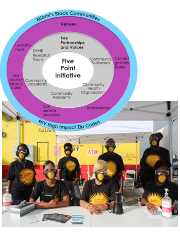 The objective of this study wasto administer a brief survey related to HIV prevention, treatment, and other factors to community members of five Miami Dade zip codes with the highest number of Black individuals living with HIV. Surveys will collect information on factors that may be particularly exacerbated for individuals living with and at-risk for HIV in the context COVID-19. The SHINE Research Program partnered with community health organizations, community consultants/HIV experts, and local businesses to implement HIV/STI testing, COVID-19 vaccines, provide PrEP information and linkage, and condom distribution. This 2-year Implementation EHE refined the implementation strategies from our 1-year EHE planning Five Point Initiative and we expanded our reach to 12 HIV high impact zip codes.
The objective of this study wasto administer a brief survey related to HIV prevention, treatment, and other factors to community members of five Miami Dade zip codes with the highest number of Black individuals living with HIV. Surveys will collect information on factors that may be particularly exacerbated for individuals living with and at-risk for HIV in the context COVID-19. The SHINE Research Program partnered with community health organizations, community consultants/HIV experts, and local businesses to implement HIV/STI testing, COVID-19 vaccines, provide PrEP information and linkage, and condom distribution. This 2-year Implementation EHE refined the implementation strategies from our 1-year EHE planning Five Point Initiative and we expanded our reach to 12 HIV high impact zip codes.
This study involved completion of a brief survey related to HIV prevention and treatment and HIV testing (or COVID-19 testing when applicable) in exchange for a $20 service voucher at the local business partnering with us at these community events.
Monitoring Microaggressions and Adversities to Generate Interventions for Change (MMAGIC)
NIMH 1R56MH121194-01
 The purpose of this study was to assess whether microaggressions and discrimination (macroaggressions) experienced by BWLWH negatively impacted HIV viral suppression by way of mental health symptoms (e.g. post-traumatic stress disorder, depression, substance use) and health behaviors (i.e. ART adherence, engagement in care). We collected data longitudinally on microaggressions experienced by BWLWH via a short daily text message, and more extensively via assessments at three-month intervals. The study involved up to five visits over a period of one year. The data collected from this R56 MMAIC project helped create the foundation for our larger 4-year R01 MMAGIC project mentioned above.
The purpose of this study was to assess whether microaggressions and discrimination (macroaggressions) experienced by BWLWH negatively impacted HIV viral suppression by way of mental health symptoms (e.g. post-traumatic stress disorder, depression, substance use) and health behaviors (i.e. ART adherence, engagement in care). We collected data longitudinally on microaggressions experienced by BWLWH via a short daily text message, and more extensively via assessments at three-month intervals. The study involved up to five visits over a period of one year. The data collected from this R56 MMAIC project helped create the foundation for our larger 4-year R01 MMAGIC project mentioned above.
Burnout among service providers for people living with HIV: Coping and Resilience Enhancement (BCARE)
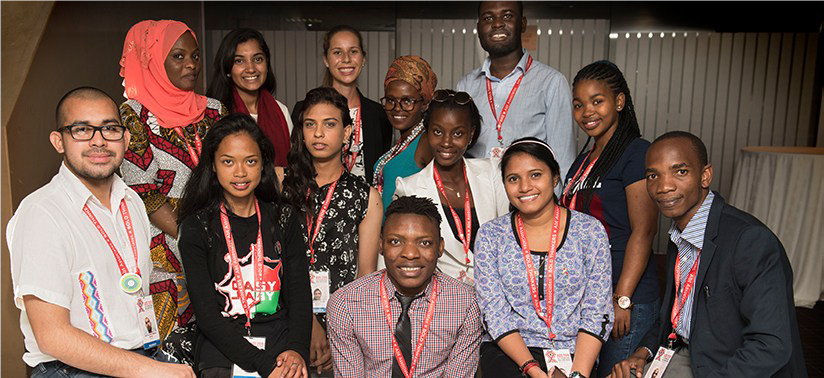 Co-led by Rachelle Reid (graduate student) and Dr. Dale the aims of this project were to 1) Quantitatively assess factors (i.e., sociodemographics, discrimination, organizational features, trauma, and depression) associated with burnout among service providers for people living with HIV (PLWH) as well as resilience factors and coping strategies that may serve as a buffer or moderator against burnout and 2) Qualitatively explore the ways in which service providers for PLWH experience and cope with burnout, resilience factors related to burnout, and the potential acceptability of a brief intervention targeting burnout among service providers for PLWH. This study employed a mixed methods design that involved data collection via surveys and semi-structured interviews with professionals who have functioned in one of the following capacities in the past year: case manager/worker, peer counsellor, group facilitator, HIV tester or social worker.
Co-led by Rachelle Reid (graduate student) and Dr. Dale the aims of this project were to 1) Quantitatively assess factors (i.e., sociodemographics, discrimination, organizational features, trauma, and depression) associated with burnout among service providers for people living with HIV (PLWH) as well as resilience factors and coping strategies that may serve as a buffer or moderator against burnout and 2) Qualitatively explore the ways in which service providers for PLWH experience and cope with burnout, resilience factors related to burnout, and the potential acceptability of a brief intervention targeting burnout among service providers for PLWH. This study employed a mixed methods design that involved data collection via surveys and semi-structured interviews with professionals who have functioned in one of the following capacities in the past year: case manager/worker, peer counsellor, group facilitator, HIV tester or social worker.
Project SUSTAIN: Understanding the Impact of COVID-19 among Black Women Living with HIV
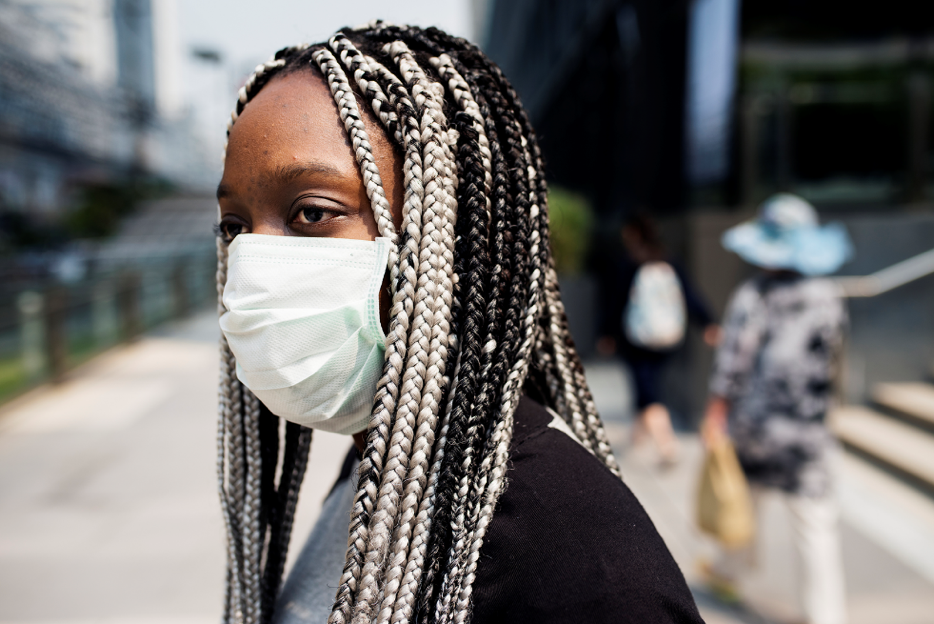 Project SUSTAIN was funded by University of Miami’s College of Arts and Sciences at the onset of COVID-19 in 2020. The aims of this study were to: (1) Conduct qualitative phone interviews to obtain information on a) their concerns and worries regarding the COVID-19 and their health b) disruptions in their HIV care and c ) information, practices, support and coping strategies that they desire or find beneficial in sustaining their health in the context of COVID-19 and (2) Administer quantitative measures to 100 BWLWH via phone on issues related to COVID-19 including health concerns (HIV and co-occurring illnesses), medication access and adherence, food insecurity, housing instability, financial resources/income, and coping strategies (e.g. social support, spirituality). Project SUSTAIN employed a mixed methods approach to data collection and analysis via surveys and semi-structured interviews with Black Women Living with HIV.
Project SUSTAIN was funded by University of Miami’s College of Arts and Sciences at the onset of COVID-19 in 2020. The aims of this study were to: (1) Conduct qualitative phone interviews to obtain information on a) their concerns and worries regarding the COVID-19 and their health b) disruptions in their HIV care and c ) information, practices, support and coping strategies that they desire or find beneficial in sustaining their health in the context of COVID-19 and (2) Administer quantitative measures to 100 BWLWH via phone on issues related to COVID-19 including health concerns (HIV and co-occurring illnesses), medication access and adherence, food insecurity, housing instability, financial resources/income, and coping strategies (e.g. social support, spirituality). Project SUSTAIN employed a mixed methods approach to data collection and analysis via surveys and semi-structured interviews with Black Women Living with HIV.
Writing to Alleviate Violence Exposure for Transgender Women (WAVE- TW)
NIH P30AI073961
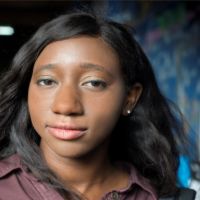 This study was executed through a close collaboration between the PI (Dr. Dale) and Empower “U” Community Health Center. This study started as a formative qualitative phase whose goal was to assess the feasibility and acceptability of a trauma writing intervention with an integrated session on medication adherence among transgender women living with HIV. Due to enrollment numbers, this study was unable to move onto the open pilot trial phase to assess the trauma writing intervention and integrated session on medication adherence among transgender women living with HIV. Dr. Dale, her research team, and Empower “U” Community Health Center hope to examine the preliminary data collected from the formative qualitative phase and find ways to overcome barriers that may have impacted recruitment efforts in order to continue this work in the future.
This study was executed through a close collaboration between the PI (Dr. Dale) and Empower “U” Community Health Center. This study started as a formative qualitative phase whose goal was to assess the feasibility and acceptability of a trauma writing intervention with an integrated session on medication adherence among transgender women living with HIV. Due to enrollment numbers, this study was unable to move onto the open pilot trial phase to assess the trauma writing intervention and integrated session on medication adherence among transgender women living with HIV. Dr. Dale, her research team, and Empower “U” Community Health Center hope to examine the preliminary data collected from the formative qualitative phase and find ways to overcome barriers that may have impacted recruitment efforts in order to continue this work in the future.
Five Point Initiative
1-Year EHE Planning Supplement
NIMH 1 P30 MH116867-01
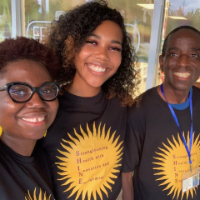 This 1-year planning EHE allowed for the establishment and construction of partnerships across 4 HIV high impact zip codes (13 businesses, 5 health partners) to pilot the Five Point Initiative approach within Miami communities and engage residents. The SHINE Research Program (1) partnered with 13 businesses (barbershops, hair/beauty salons, laundromats, corner stores, and mechanics) in five predominantly Black communities in Miami (2) closely collaborated with 5 community health organizations funded by the CDC, HRSA, and/or SAMHSA and (3) hosted twenty five events in which community members completed a brief electronic survey in exchange for a service/voucher (e.g. free laundry wash and dry) and were offered HIV/STI voluntary counseling and testing, and condoms. Outcomes of the Five Point Initiative included (a) survey information (e.g. HIV status, HIV treatment, knowledge of and access to PrEP, barriers to medical and mental health care) and pilot data (acceptability and feasibility of the approach), (b) expansion of the D-ARC reach to Black individuals in HIV high impact zip codes in Miami, (c) a local framework for implementation and dissemination efforts in high impact zip codes in Miami, (d) condom distribution, and (e) HIV/STI testing by community health organizations.
This 1-year planning EHE allowed for the establishment and construction of partnerships across 4 HIV high impact zip codes (13 businesses, 5 health partners) to pilot the Five Point Initiative approach within Miami communities and engage residents. The SHINE Research Program (1) partnered with 13 businesses (barbershops, hair/beauty salons, laundromats, corner stores, and mechanics) in five predominantly Black communities in Miami (2) closely collaborated with 5 community health organizations funded by the CDC, HRSA, and/or SAMHSA and (3) hosted twenty five events in which community members completed a brief electronic survey in exchange for a service/voucher (e.g. free laundry wash and dry) and were offered HIV/STI voluntary counseling and testing, and condoms. Outcomes of the Five Point Initiative included (a) survey information (e.g. HIV status, HIV treatment, knowledge of and access to PrEP, barriers to medical and mental health care) and pilot data (acceptability and feasibility of the approach), (b) expansion of the D-ARC reach to Black individuals in HIV high impact zip codes in Miami, (c) a local framework for implementation and dissemination efforts in high impact zip codes in Miami, (d) condom distribution, and (e) HIV/STI testing by community health organizations.
Striving Towards Empowerment and Medication Adherence (STEP-AD)
 STEP-AD was funded by a Mentored Career Development Award (K23) from the National Institute of Mental Health. The purpose of STEP-AD was to develop and assess the feasibility and acceptability of an intervention to improve medication adherence for Black women with HIV. The intervention combined evidence-based strategies for trauma symptom reduction, strategies for coping with racial and HIV-related discrimination, gender empowerment, problem solving techniques for medication adherence, and other resilient coping techniques. The STEP-AD study consisted of four phases: (1) formative/qualitative phase (completed), (2) open pilot trial (completed), (3) small RCT, and (4) preparation for an R01 application in partnership with a community-based clinic/organization. This study involved up to 13 study visits over a 6-month period and participants were compensated for their participation in this study.
STEP-AD was funded by a Mentored Career Development Award (K23) from the National Institute of Mental Health. The purpose of STEP-AD was to develop and assess the feasibility and acceptability of an intervention to improve medication adherence for Black women with HIV. The intervention combined evidence-based strategies for trauma symptom reduction, strategies for coping with racial and HIV-related discrimination, gender empowerment, problem solving techniques for medication adherence, and other resilient coping techniques. The STEP-AD study consisted of four phases: (1) formative/qualitative phase (completed), (2) open pilot trial (completed), (3) small RCT, and (4) preparation for an R01 application in partnership with a community-based clinic/organization. This study involved up to 13 study visits over a 6-month period and participants were compensated for their participation in this study.
Motivational Interviewing to Increase Motivation for PrEP Uptake Among Black Woman at Risk for HIV (MI-PrEP)
 MI-PrEP was funded by the University of Miami’s Provost Award. This study developed and piloted a brief two-session counseling intervention combining psychoeducation on PrEP, Motivational Interviewing techniques, and case management (e.g. helping with access to insurance or medication programs for low-income patients) in a culturally-informed manner. This study aimed to promote PrEP uptake among Black women at high risk for HIV. MI-PrEP used evidence-based counseling techniques shown to increase health-enhancing behaviors in brief interventions. The MI-PrEP study consisted of two phases: an open pilot trial and a randomized control trial. Participants in this study attended up to three study visits over a 6-week period and received compensation for their participation.
MI-PrEP was funded by the University of Miami’s Provost Award. This study developed and piloted a brief two-session counseling intervention combining psychoeducation on PrEP, Motivational Interviewing techniques, and case management (e.g. helping with access to insurance or medication programs for low-income patients) in a culturally-informed manner. This study aimed to promote PrEP uptake among Black women at high risk for HIV. MI-PrEP used evidence-based counseling techniques shown to increase health-enhancing behaviors in brief interventions. The MI-PrEP study consisted of two phases: an open pilot trial and a randomized control trial. Participants in this study attended up to three study visits over a 6-week period and received compensation for their participation.




 The Five Point Initiative is a locally developed and community co-developed bundled implementation strategy that harnesses the collective contribution of community consultants/collaborators, community businesses, and healthcare organizations to improve HIV testing and PrEP linkage.
The Five Point Initiative is a locally developed and community co-developed bundled implementation strategy that harnesses the collective contribution of community consultants/collaborators, community businesses, and healthcare organizations to improve HIV testing and PrEP linkage. Project
Project This project builds off of our 1-year R56 NIMH project which further demonstrated the importance of longitudinally studying the unique role of microaggressions and frequent adversities (e.g. violence/trauma, housing and food insecurity) in relation to HIV viral suppression among BWLWH. This project continues to assess whether microaggressions (daily slights) and discrimination experienced by BWLWH negatively impact HIV viral suppression by way of mental health symptoms (e.g. post-traumatic stress symptoms, depression, anxiety, substance use) and health behaviors (ART adherence and engagement in care). We will longitudinally examine both potential direct effects and moderation by resilience factors at the individual (e.g. self-efficacy), interpersonal (e.g. social support), and neighborhood level (e.g. community health centers). By elucidating these pathways to viral suppression among BWLWH and having ongoing engagement with community partners, our findings will directly inform interventions for BWLWH. This project is precisely aligned with the NIH HIV/AIDS (high) Research Priority for supporting research to reduce health disparities in treatment outcomes of those living with HIV.
This project builds off of our 1-year R56 NIMH project which further demonstrated the importance of longitudinally studying the unique role of microaggressions and frequent adversities (e.g. violence/trauma, housing and food insecurity) in relation to HIV viral suppression among BWLWH. This project continues to assess whether microaggressions (daily slights) and discrimination experienced by BWLWH negatively impact HIV viral suppression by way of mental health symptoms (e.g. post-traumatic stress symptoms, depression, anxiety, substance use) and health behaviors (ART adherence and engagement in care). We will longitudinally examine both potential direct effects and moderation by resilience factors at the individual (e.g. self-efficacy), interpersonal (e.g. social support), and neighborhood level (e.g. community health centers). By elucidating these pathways to viral suppression among BWLWH and having ongoing engagement with community partners, our findings will directly inform interventions for BWLWH. This project is precisely aligned with the NIH HIV/AIDS (high) Research Priority for supporting research to reduce health disparities in treatment outcomes of those living with HIV.

 Addressing Unmet PrEP Needs
Addressing Unmet PrEP Needs The objective of this study wasto administer a brief survey related to HIV prevention, treatment, and other factors to community members of five Miami Dade zip codes with the highest number of Black individuals living with HIV. Surveys will collect information on factors that may be particularly exacerbated for individuals living with and at-risk for HIV in the context COVID-19. The SHINE Research Program partnered with community health organizations, community consultants/HIV experts, and local businesses to implement HIV/STI testing, COVID-19 vaccines, provide PrEP information and linkage, and condom distribution. This 2-year Implementation EHE refined the implementation strategies from our 1-year EHE planning Five Point Initiative and we expanded our reach to 12 HIV high impact zip codes.
The objective of this study wasto administer a brief survey related to HIV prevention, treatment, and other factors to community members of five Miami Dade zip codes with the highest number of Black individuals living with HIV. Surveys will collect information on factors that may be particularly exacerbated for individuals living with and at-risk for HIV in the context COVID-19. The SHINE Research Program partnered with community health organizations, community consultants/HIV experts, and local businesses to implement HIV/STI testing, COVID-19 vaccines, provide PrEP information and linkage, and condom distribution. This 2-year Implementation EHE refined the implementation strategies from our 1-year EHE planning Five Point Initiative and we expanded our reach to 12 HIV high impact zip codes. The purpose of this study was to assess whether microaggressions and discrimination (macroaggressions) experienced by BWLWH negatively impacted HIV viral suppression by way of mental health symptoms (e.g. post-traumatic stress disorder, depression, substance use) and health behaviors (i.e. ART adherence, engagement in care). We collected data longitudinally on microaggressions experienced by BWLWH via a short daily text message, and more extensively via assessments at three-month intervals. The study involved up to five visits over a period of one year. The data collected from this R56 MMAIC project helped create the foundation for our larger 4-year R01 MMAGIC project mentioned above.
The purpose of this study was to assess whether microaggressions and discrimination (macroaggressions) experienced by BWLWH negatively impacted HIV viral suppression by way of mental health symptoms (e.g. post-traumatic stress disorder, depression, substance use) and health behaviors (i.e. ART adherence, engagement in care). We collected data longitudinally on microaggressions experienced by BWLWH via a short daily text message, and more extensively via assessments at three-month intervals. The study involved up to five visits over a period of one year. The data collected from this R56 MMAIC project helped create the foundation for our larger 4-year R01 MMAGIC project mentioned above. Co-led by Rachelle Reid (graduate student) and Dr. Dale the aims of this project were to 1) Quantitatively assess factors (i.e., sociodemographics, discrimination, organizational features, trauma, and depression) associated with burnout among service providers for people living with HIV (PLWH) as well as resilience factors and coping strategies that may serve as a buffer or moderator against burnout and 2) Qualitatively explore the ways in which service providers for PLWH experience and cope with burnout, resilience factors related to burnout, and the potential acceptability of a brief intervention targeting burnout among service providers for PLWH. This study employed a mixed methods design that involved data collection via surveys and semi-structured interviews with professionals who have functioned in one of the following capacities in the past year: case manager/worker, peer counsellor, group facilitator, HIV tester or social worker.
Co-led by Rachelle Reid (graduate student) and Dr. Dale the aims of this project were to 1) Quantitatively assess factors (i.e., sociodemographics, discrimination, organizational features, trauma, and depression) associated with burnout among service providers for people living with HIV (PLWH) as well as resilience factors and coping strategies that may serve as a buffer or moderator against burnout and 2) Qualitatively explore the ways in which service providers for PLWH experience and cope with burnout, resilience factors related to burnout, and the potential acceptability of a brief intervention targeting burnout among service providers for PLWH. This study employed a mixed methods design that involved data collection via surveys and semi-structured interviews with professionals who have functioned in one of the following capacities in the past year: case manager/worker, peer counsellor, group facilitator, HIV tester or social worker. Project SUSTAIN was funded by University of Miami’s College of Arts and Sciences at the onset of COVID-19 in 2020. The aims of this study were to: (1) Conduct qualitative phone interviews to obtain information on a) their concerns and worries regarding the COVID-19 and their health b) disruptions in their HIV care and c ) information, practices, support and coping strategies that they desire or find beneficial in sustaining their health in the context of COVID-19 and (2) Administer quantitative measures to 100 BWLWH via phone on issues related to COVID-19 including health concerns (HIV and co-occurring illnesses), medication access and adherence, food insecurity, housing instability, financial resources/income, and coping strategies (e.g. social support, spirituality). Project SUSTAIN employed a mixed methods approach to data collection and analysis via surveys and semi-structured interviews with Black Women Living with HIV.
Project SUSTAIN was funded by University of Miami’s College of Arts and Sciences at the onset of COVID-19 in 2020. The aims of this study were to: (1) Conduct qualitative phone interviews to obtain information on a) their concerns and worries regarding the COVID-19 and their health b) disruptions in their HIV care and c ) information, practices, support and coping strategies that they desire or find beneficial in sustaining their health in the context of COVID-19 and (2) Administer quantitative measures to 100 BWLWH via phone on issues related to COVID-19 including health concerns (HIV and co-occurring illnesses), medication access and adherence, food insecurity, housing instability, financial resources/income, and coping strategies (e.g. social support, spirituality). Project SUSTAIN employed a mixed methods approach to data collection and analysis via surveys and semi-structured interviews with Black Women Living with HIV. This study was executed through a close collaboration between the PI (Dr. Dale) and Empower “U” Community Health Center. This study started as a formative qualitative phase whose goal was to assess the feasibility and acceptability of a trauma writing intervention with an integrated session on medication adherence among transgender women living with HIV. Due to enrollment numbers, this study was unable to move onto the open pilot trial phase to assess the trauma writing intervention and integrated session on medication adherence among transgender women living with HIV. Dr. Dale, her research team, and Empower “U” Community Health Center hope to examine the preliminary data collected from the formative qualitative phase and find ways to overcome barriers that may have impacted recruitment efforts in order to continue this work in the future.
This study was executed through a close collaboration between the PI (Dr. Dale) and Empower “U” Community Health Center. This study started as a formative qualitative phase whose goal was to assess the feasibility and acceptability of a trauma writing intervention with an integrated session on medication adherence among transgender women living with HIV. Due to enrollment numbers, this study was unable to move onto the open pilot trial phase to assess the trauma writing intervention and integrated session on medication adherence among transgender women living with HIV. Dr. Dale, her research team, and Empower “U” Community Health Center hope to examine the preliminary data collected from the formative qualitative phase and find ways to overcome barriers that may have impacted recruitment efforts in order to continue this work in the future. This 1-year planning EHE allowed for the establishment and construction of partnerships across 4 HIV high impact zip codes (13 businesses, 5 health partners) to pilot the Five Point Initiative approach within Miami communities and engage residents. The SHINE Research Program (1) partnered with 13 businesses (barbershops, hair/beauty salons, laundromats, corner stores, and mechanics) in five predominantly Black communities in Miami (2) closely collaborated with 5 community health organizations funded by the CDC, HRSA, and/or SAMHSA and (3) hosted twenty five events in which community members completed a brief electronic survey in exchange for a service/voucher (e.g. free laundry wash and dry) and were offered HIV/STI voluntary counseling and testing, and condoms. Outcomes of the Five Point Initiative included (a) survey information (e.g. HIV status, HIV treatment, knowledge of and access to PrEP, barriers to medical and mental health care) and pilot data (acceptability and feasibility of the approach), (b) expansion of the D-ARC reach to Black individuals in HIV high impact zip codes in Miami, (c) a local framework for implementation and dissemination efforts in high impact zip codes in Miami, (d) condom distribution, and (e) HIV/STI testing by community health organizations.
This 1-year planning EHE allowed for the establishment and construction of partnerships across 4 HIV high impact zip codes (13 businesses, 5 health partners) to pilot the Five Point Initiative approach within Miami communities and engage residents. The SHINE Research Program (1) partnered with 13 businesses (barbershops, hair/beauty salons, laundromats, corner stores, and mechanics) in five predominantly Black communities in Miami (2) closely collaborated with 5 community health organizations funded by the CDC, HRSA, and/or SAMHSA and (3) hosted twenty five events in which community members completed a brief electronic survey in exchange for a service/voucher (e.g. free laundry wash and dry) and were offered HIV/STI voluntary counseling and testing, and condoms. Outcomes of the Five Point Initiative included (a) survey information (e.g. HIV status, HIV treatment, knowledge of and access to PrEP, barriers to medical and mental health care) and pilot data (acceptability and feasibility of the approach), (b) expansion of the D-ARC reach to Black individuals in HIV high impact zip codes in Miami, (c) a local framework for implementation and dissemination efforts in high impact zip codes in Miami, (d) condom distribution, and (e) HIV/STI testing by community health organizations. STEP-AD was funded by a Mentored Career Development Award (K23) from the National Institute of Mental Health. The purpose of STEP-AD was to develop and assess the feasibility and acceptability of an intervention to improve medication adherence for Black women with HIV. The intervention combined evidence-based strategies for trauma symptom reduction, strategies for coping with racial and HIV-related discrimination, gender empowerment, problem solving techniques for medication adherence, and other resilient coping techniques. The STEP-AD study consisted of four phases: (1) formative/qualitative phase (completed), (2) open pilot trial (completed), (3) small RCT, and (4) preparation for an R01 application in partnership with a community-based clinic/organization. This study involved up to 13 study visits over a 6-month period and participants were compensated for their participation in this study.
STEP-AD was funded by a Mentored Career Development Award (K23) from the National Institute of Mental Health. The purpose of STEP-AD was to develop and assess the feasibility and acceptability of an intervention to improve medication adherence for Black women with HIV. The intervention combined evidence-based strategies for trauma symptom reduction, strategies for coping with racial and HIV-related discrimination, gender empowerment, problem solving techniques for medication adherence, and other resilient coping techniques. The STEP-AD study consisted of four phases: (1) formative/qualitative phase (completed), (2) open pilot trial (completed), (3) small RCT, and (4) preparation for an R01 application in partnership with a community-based clinic/organization. This study involved up to 13 study visits over a 6-month period and participants were compensated for their participation in this study. MI-PrEP was funded by the University of Miami’s Provost Award. This study developed and piloted a brief two-session counseling intervention combining psychoeducation on PrEP, Motivational Interviewing techniques, and case management (e.g. helping with access to insurance or medication programs for low-income patients) in a culturally-informed manner. This study aimed to promote PrEP uptake among Black women at high risk for HIV. MI-PrEP used evidence-based counseling techniques shown to increase health-enhancing behaviors in brief interventions. The MI-PrEP study consisted of two phases: an open pilot trial and a randomized control trial. Participants in this study attended up to three study visits over a 6-week period and received compensation for their participation.
MI-PrEP was funded by the University of Miami’s Provost Award. This study developed and piloted a brief two-session counseling intervention combining psychoeducation on PrEP, Motivational Interviewing techniques, and case management (e.g. helping with access to insurance or medication programs for low-income patients) in a culturally-informed manner. This study aimed to promote PrEP uptake among Black women at high risk for HIV. MI-PrEP used evidence-based counseling techniques shown to increase health-enhancing behaviors in brief interventions. The MI-PrEP study consisted of two phases: an open pilot trial and a randomized control trial. Participants in this study attended up to three study visits over a 6-week period and received compensation for their participation.